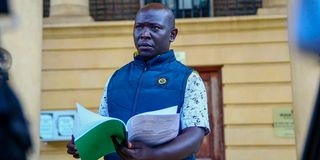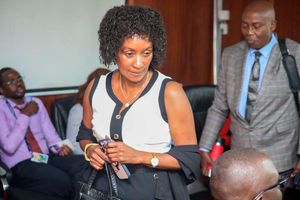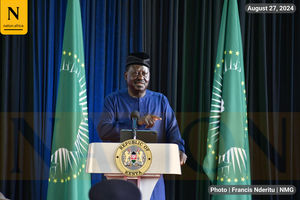
Mr Michael Kojo Otieno addressing journalists outside Milimani Law Courts on February 1, 2024.
The phrase "I have a dream" remains one of the most iconic declarations ever spoken.
Uttered by Dr Martin Luther King Jr during his historic address on August 28, 1963, at the Lincoln Memorial in Washington, DC, the words summed up the hopes of millions for racial justice and equality and became a rallying cry for the American civil rights movement.
Now, 62 years later and thousands of miles away, Kenya has found its own rallying cry, simple yet profound words that have stirred an entire generation.
During the Gen Z-led protests of 2024, the phrases "the people shall" and "the people may" echoed across social media, placards and public forums, resonating with the frustrations of a populace demanding lower taxes, accountability and even the resignation of President William Ruto.
Though embedded in Kenya’s 2010 Constitution, these constitutional phrases had long existed in the background of legal and civic discussions until they were thrust into the national limelight by a man from Homa Bay.
In October 2023, at the Bomas of Kenya, Michael Otieno Kojo, a human rights activist, etched his name into Kenya's civic history.
Taking the microphone before a room full of powerful legislators and officials, Mr Kojo used the moment not merely to express grievances but to educate the masses on the difference between "shall" and "may" as used in the Constitution.
This was during public participation hearings on the National Dialogue Committee report.
His words were met with laughter and applause. A video of his impassioned explanation swiftly went viral, and his articulation of popular sovereignty, enshrined in Article 1 of the Constitution, resonated deeply with ordinary Kenyans.
“I was only trying to explain how those words apply in the Kenyan context. I did not expect it would become part of a national revolt,” Mr Kojo said in an interview with Nation.
Far from regretting the widespread use of his video, voice and image, Mr Kojo embraced the outcome.
“It has empowered some Kenyans who struggle to articulate their rights,” he reflected.
Article 1 of Kenya’s Constitution proclaims that, “All sovereign power belongs to the people of Kenya and shall be exercised only in accordance with this Constitution.”
It further affirms that this power may be exercised either directly or through elected representatives. In his now-famous moment, Mr Kojo emphasised the distinction: “Shall” is mandatory—it must be done. “May” is permissive—it’s optional.
That distinction, though seemingly technical, became a spark. It reinforced a long-overlooked truth: political power in Kenya originates not from Parliament, but from the people. His demonstration became a meme, a chant, and a banner under which many rallied.
Mr Kojo’s journey to this defining moment began decades earlier at Kuoyo Kochia High School, where he proved to be an avid student of history, immersing himself in constitutional law and civic responsibility.
He read the Wako Draft of 2005, followed the debates around the Bomas Draft and regularly read newspaper articles on governance and human rights.
“Some of my classmates are now advocates of the High Court. Our teachers really instilled in us the importance of knowing the law,” he said proudly.
Today, Mr Kojo is not only a human rights activist but also a court process server, a professional charged with formally delivering legal documents.

Mr Michael Kojo Otieno addressing journalists outside Milimani Law Courts on February 1, 2024.
His understanding of the legal system has made him a familiar figure in the corridors of the Law Courts in Homa Bay, the Court of Appeal in Kisumu and various courts in Nairobi. His unrelenting legal advocacy has even taken him to the East African Court of Justice.
In his hometown, people have nicknamed him “the Okiya Omtatah of Homa Bay,” comparing him to the popular Busia County Senator known for filing public interest litigations.
Mr Kojo’s opportunity to speak at Bomas was not by chance.
Accompanied by his friend Evance Oloo, he says he travelled over 350 kilometres to Nairobi, six hours on the road, to exercise his civic duty. They carried with them a memorandum crafted with the help of fellow activists outlining their vision for a more just Kenya.
But once at Bomas, it was Mr Kojo’s unflinching clarity that stole the show.
“The discussions seemed to revolve around leaders, not the people. There were individuals in the room who had served in the National Assembly or were still serving. It felt elitist and disconnected from ordinary Kenyans,” he recalled.
When asked if he was familiar with Article 1, he did not hesitate. He quoted it and used it to make an unwavering point that the people of Kenya, not its politicians, are the true sovereigns.
In 2024, Mr Kojo made headlines once again this time for filing a petition with the Judicial Service Commission, seeking the removal of Chief Justice Martha Koome.
He claimed the Chief Justice had breached legal procedure in appointing members to the Tax Appeals Tribunal.
It was a bold move that earned him both praise and peril, as advocacy is not without cost.
“I receive threats almost daily from people who feel that my work is disruptive,” he said.
Despite the fame, Mr Kojo remains grounded, and he says his goal is not the spotlight but to ensure that civic education reaches every Kenyan.
“I want people to read the Constitution and not just hear about it. It is the only way they can defend their rights,” he challenged.









